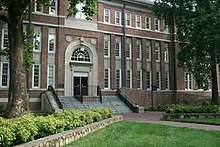Archibald Murphey
Archibald DeBow Murphey (born in the Red House community in Orange County (now Caswell County), North Carolina, ca. 1777; died February 1, 1832) was a North Carolina politician known as the "Father of Education" in his state for his proposals that benefited public works and public education.[1]
Murphey was born near Red House Presbyterian Church in Orange County, North Carolina (in an area that would later become Caswell County). His father Archibald Murphey was a North Carolina revolutionary officer, while his mother, Jane DeBow was from New Jersey. Archibald was one of seven children. He was educated at Dr. Caldwell's Academy, and entered the University of North Carolina in 1796 and graduated in 1799 with honors.[2]
Murphey served as a professor at his college for a few years, then moved to Hillsborough to study law with William Duffy from July to November 1801 at the home now known as Twin Chimneys. He married Jane Armistead Scott and bought the Hermitage plantation from Jane Armistead Scott's father, John Scott. Murphey was very active in business and political affairs and represented Orange County in the North Carolina State Senate from 1812 to 1818.
Murphey was well known for his proposals regarding internal improvements, public schools, and constitutional reform. In 1817, Murphey submitted a legislative report recommending that North Carolina create a publicly financed system of education. In 1819, he drafted a document proposing a program to build roads and canals throughout the state. This proposal was ignored by Murphey's fellow legislators. In 1818, he was elected a superior court judge by the legislature, but gave up the position after two years to concentrate on his worsening financial situation and to research and publish a history of the State of North Carolina. Unsuccessful in securing a seat on the North Carolina Supreme Court, he nevertheless sat on the court in its early years to fill in when any of the three judges on the court had to disqualify themselves because of their previous law practices.[3]

Murphey did not have much luck in accomplishing any of his goals. Many of the results to his plans came after his death. His state history was never written, lacking the funding that it needed. He did however collect papers, the first volume of which are held by Harvard and the second volume by the University of Virginia, that were helpful for later historians. Meanwhile, Murphey's financial problems were getting worse and worse. Being unable to pay his debts, Murphey was even put in jail for twenty days in Greensboro, North Carolina in 1829.
Archibald Murphey died at Twin Chimneys in Hillsborough on February 1, 1832. He is buried at the Presbyterian Church in Hillsborough, North Carolina. The town of Murphy, North Carolina (despite its spelling) was named after him. Murphey Traditional Academy, an elementary school in Greensboro, North Carolina, also bears his name, as well as Murphey Hall at the University of North Carolina,[4] and several other schools in Orange and Caswell County.
An historical marker located along Churton Street in Hillsborough, North Carolina, summarizes his career and also indicates the proximity of his grave.[5]
References
- "Archibald Murphey - North Carolina Digital History". Retrieved 20 June 2016.
- John C. Baroody; Joe Mobley; John Clauser (October 1981). "David Caldwell Log College Site" (pdf). National Register of Historic Places - Nomination and Inventory. North Carolina State Historic Preservation Office. Retrieved 2014-11-01.
- North Carolina Reports: Cases Argued and Determined in the Supreme Court of North Carolina. state. 1 January 1919. Retrieved 20 June 2016 – via Internet Archive.
- "Murphey Hall History - Department of Classics - The University of North Carolina at Chapel Hill". Retrieved 20 June 2016.
- "Marker: G-9". Retrieved 20 June 2016.